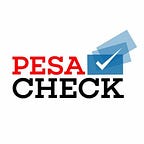MISLEADING: This photo claiming to show Raila Odinga after collapsing at his Karen home is old
The photo was taken in 2017 when the politician was hospitalised after addressing rallies in Kilifi.
A photo shared on Facebook with text claiming Kenyan presidential hopeful Raila Odinga collapsed at his Karen home due to exhaustion is MISLEADING.
The post, dated 24 June 2022 reads; “There are reports that at around 6.30 pm this evening, Azimio La Umoja Presidential flag bearer Raila Odinga collapsed at his Karen residence due to exhaustion. Jakom, we need you strong and healthy so that you can concede healthily on 10th August. Wishing you more years.”
A similar claim was made here.
Odinga was cleared to run for president by the Independent Electoral and Boundaries Commission (IEBC) on the Azimio la Umoja coalition ticket on 5 June 2022.
Alongside his running mate, Martha Karua, Odinga has been on a campaign trail wooing voters ahead of the 9 August 2022 polls.
A Google reverse image search shows the photo in question was first shared in 2017. Major local news outlets used the photo in the claim to report that Odinga had been hospitalised after addressing rallies in Kilifi. At the time, he was running for president on a National Super Alliance (NASA) ticket.
The then NASA coalition spokesman, Dennis Onyango, confirmed Odinga’s hospitalisation in a Facebook post, saying it was a suspected case of food poisoning.
There have been no official reports of Odinga collapsing at his Karen residence on the Azimio coalition’s official channels of communication or credible mainstream media.
PesaCheck looked into a photo shared on Facebook with a text claiming Raila Odinga collapsed at his Karen home due to exhaustion and found it to be MISLEADING.
This post is part of an ongoing series of PesaCheck fact-checks examining content marked as potential misinformation on Facebook and other social media platforms.
By partnering with Facebook and similar social media platforms, third-party fact-checking organisations like PesaCheck are helping to sort fact from fiction. We do this by giving the public deeper insight and context to posts they see in their social media feeds.
Have you spotted what you think is fake or false information on Facebook? Here’s how you can report. And, here’s more information on PesaCheck’s methodology for fact-checking questionable content.
This fact-check was written by PesaCheck Fact-Checker Peris Gachahi and edited by PesaCheck Senior Copy Editor Cédrick Irakoze and acting chief copy editor Francis Mwaniki.
The article was approved for publication by PesaCheck managing editor Doreen Wainainah.
PesaCheck is East Africa’s first public finance fact-checking initiative. It was co-founded by Catherine Gicheru and Justin Arenstein, and is being incubated by the continent’s largest civic technology and data journalism accelerator: Code for Africa. It seeks to help the public separate fact from fiction in public pronouncements about the numbers that shape our world, with a special emphasis on pronouncements about public finances that shape government’s delivery of Sustainable Development Goals (SDG) public services, such as healthcare, rural development and access to water / sanitation. PesaCheck also tests the accuracy of media reportage. To find out more about the project, visit pesacheck.org.
PesaCheck is an initiative of Code for Africa, through its innovateAFRICA fund, with support from Deutsche Welle Akademie, in partnership with a coalition of local African media and other civic watchdog organisations.
